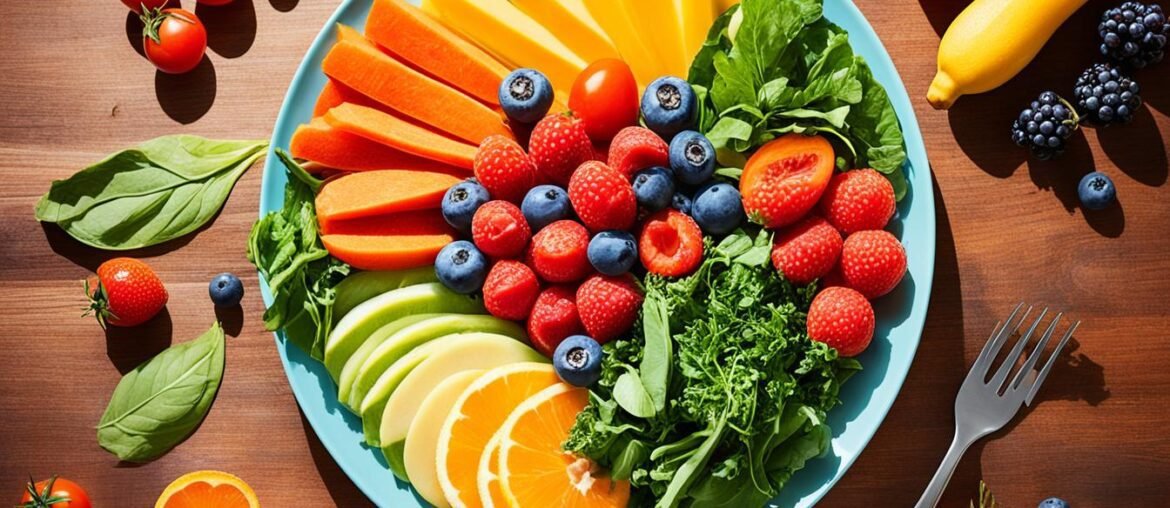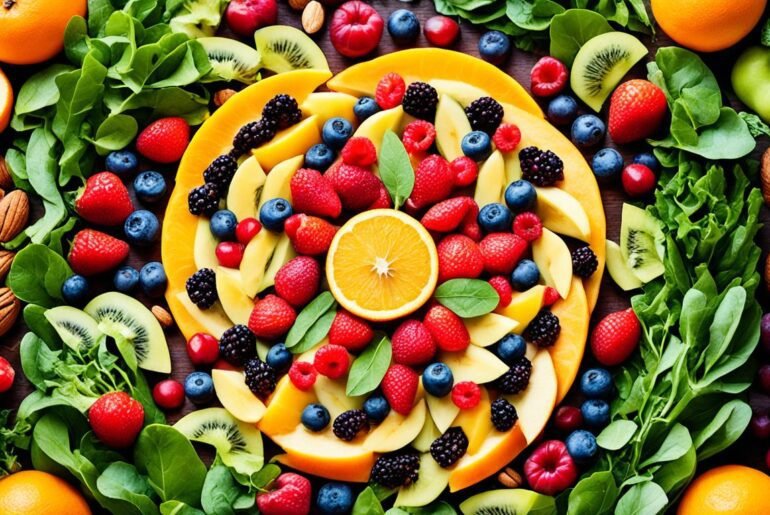Did you know that what you eat can directly impact the health and appearance of your skin? It’s true! Nutrition plays a crucial role in maintaining healthy, radiant skin, and neglecting proper nutrition can lead to various skin issues such as dryness, acne, and premature aging. The good news is that by focusing on specific nutrients and following a skin-friendly diet, you can unlock the secret to healthy and beautiful skin.
Key Takeaways:
- A balanced and skin-friendly diet is essential for achieving glowing, youthful skin.
- Eating a diet rich in fruits, vegetables, whole grains, lean proteins, and healthy fats can support clear and radiant skin.
- Key nutrients, such as vitamins A, C, and E, selenium, zinc, and essential fatty acids, play a crucial role in maintaining healthy skin.
- Antioxidant-rich foods help protect the skin against free radicals and premature aging.
- Proper hydration and the inclusion of whole grains and low-GI carbs in your diet can also contribute to healthy skin.
The Impact of Diet on Skin Health
https://www.youtube.com/watch?v=d9hP4wail-c
Numerous studies have shown that our diet has a significant impact on our skin health. Eating a diet rich in fruits, vegetables, whole grains, lean proteins, and healthy fats can provide the necessary nutrients to support clear and radiant skin.
Antioxidant-rich foods, such as berries, dark leafy greens, and colorful fruits, help protect the skin against free radicals and prevent premature aging. Including foods high in essential fatty acids, like salmon and nuts, can nourish the skin and maintain its moisture barrier. By adopting a skin-friendly diet, we can enhance our skin’s natural beauty and promote overall skin health.
| Antioxidant-rich Foods | Essential Fatty Acids |
|---|---|
|
|
| Help protect the skin against free radicals | Nourish the skin and maintain its moisture barrier |
By making conscious choices about the foods we eat, we can provide our skin with the necessary nutrients for optimal health. Including a variety of skin-friendly foods in our diet can help us achieve clear, glowing skin and maintain its vitality in the long run.
Essential Nutrients for Healthy Skin
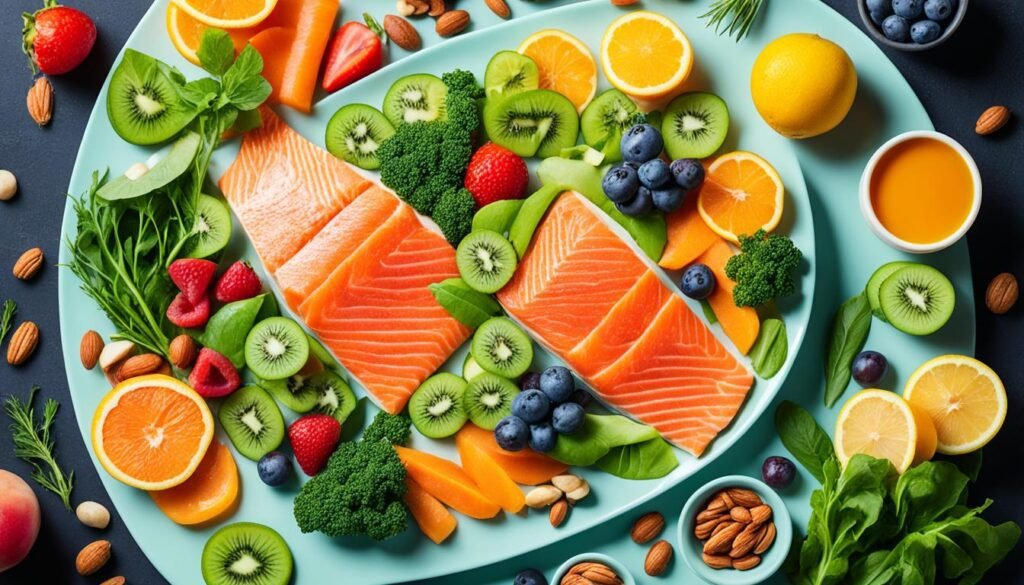
Certain nutrients play a crucial role in maintaining healthy skin. To achieve a radiant complexion, it’s important to incorporate a variety of skin-nourishing foods into our diet. These nutrient-rich foods work from within to promote skin health and vitality.
Vitamin A: Found in low-fat dairy products, Vitamin A is essential for the health of skin cells. It aids in repairing and maintaining the skin, providing a youthful appearance.
Antioxidants: Including antioxidants in our diet helps protect the skin from oxidative stress and supports collagen production. Key antioxidants for skin health include:
- Vitamin C: Citrus fruits like oranges and strawberries are excellent sources of Vitamin C, which aids in collagen production and promotes a healthy, youthful complexion.
- Vitamin E: Nuts and seeds, such as almonds and sunflower seeds, are rich in Vitamin E, a powerful antioxidant that helps protect the skin from free radicals and premature aging.
- Selenium: Seafood, particularly tuna and oysters, contains selenium, which plays a vital role in antioxidant defenses and supports overall skin health.
- Zinc: Whole grains and legumes, like brown rice and lentils, are excellent sources of zinc. This essential mineral aids in wound healing and helps maintain healthy skin.
By incorporating these foods into our diet, we can nourish our skin from within and promote a healthy and radiant complexion.
The Power of Antioxidant-Rich Foods
Antioxidant-rich foods play a crucial role in maintaining healthy skin and achieving a glowing complexion. These foods are packed with beneficial compounds that help fight free radicals, protect the skin from damage, and promote a youthful appearance. Including a variety of antioxidant-rich foods in our diet can provide the necessary nutrients for healthy and radiant skin.
“Antioxidants help fight against the harmful effects of free radicals, which can damage the skin’s cells and accelerate aging.”
When it comes to antioxidant-rich foods, berries are a top choice. They are loaded with vitamins, minerals, and antioxidants that help protect the skin from environmental stressors and promote collagen synthesis. Whether it’s blueberries, strawberries, or raspberries, adding a handful of these delicious fruits to your daily diet can work wonders for your skin.
Citrus fruits, like oranges and grapefruits, are also excellent sources of antioxidants. They are rich in vitamin C, a potent antioxidant that supports collagen production, brightens the skin, and helps maintain a healthy complexion. Including a glass of fresh orange juice or a slice of grapefruit in your breakfast routine can provide a refreshing boost to your skin’s health.
Another antioxidant-rich food that deserves a spot in your diet is dark chocolate. Yes, you read that right! Dark chocolate contains flavanols, which are antioxidants that help improve blood flow to the skin, protect against sun damage, and enhance skin hydration. Indulging in a small piece of dark chocolate with a high cocoa content can be a guilt-free treat for your skin.
“Including a variety of antioxidant-rich foods in our diet can provide the necessary nutrients for healthy and glowing skin.”
Lastly, let’s not forget about the power of green tea. This popular beverage is loaded with antioxidants called catechins, which have anti-inflammatory and anti-aging effects on the skin. Drinking a cup of green tea every day can help reduce inflammation, improve skin elasticity, and give your complexion a healthy glow.
By incorporating antioxidant-rich foods like berries, citrus fruits, dark chocolate, and green tea into our diet, we can nourish our skin from the inside out. These foods help protect the skin cells, promote collagen synthesis, and maintain a youthful complexion. So why not indulge in a colorful antioxidant-rich plate and let your skin reap the benefits?
| Food | Antioxidant Content |
|---|---|
| Berries (blueberries, strawberries, raspberries) | High |
| Citrus fruits (oranges, grapefruits) | Moderate |
| Dark chocolate (high cocoa content) | Moderate |
| Green tea | High |
The Role of Essential Fatty Acids
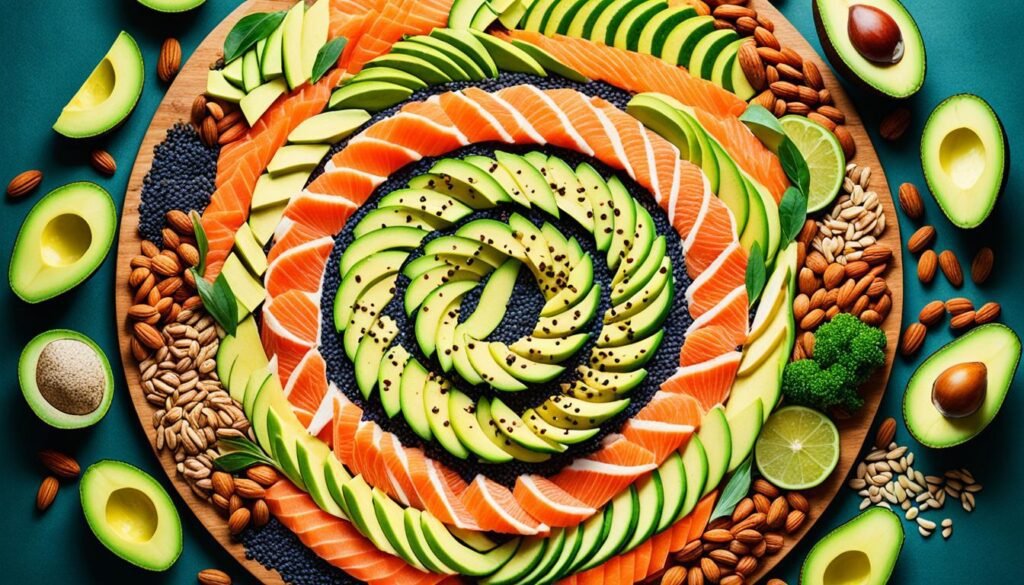
Essential fatty acids, such as omega-3 and omega-6, play a vital role in maintaining healthy skin. These fats are not produced by the body and must be obtained through our diet. They are essential for the skin’s barrier function, which is responsible for keeping the skin hydrated and preventing moisture loss. Incorporating foods rich in essential fatty acids into our diet can nourish the skin from the inside out and promote a healthy lipid barrier, resulting in supple and smooth skin.
Some excellent sources of essential fatty acids include:
- Fatty fish, such as salmon and mackerel
- Walnuts and almonds
- Flaxseed and chia seeds
- Avocados
These foods contain high levels of omega-3 and omega-6 fatty acids, which provide numerous benefits for the skin. Omega-3 fatty acids help reduce inflammation and support the skin’s natural healing processes, while omega-6 fatty acids help maintain the skin’s moisture balance.
By incorporating these skin-friendly foods into our diet, we can enhance our skin’s health and promote a radiant complexion. The essential fatty acids nourish the skin, strengthen its barrier function, and contribute to overall skin wellness.
It’s important to note that while essential fatty acids are beneficial for the skin, moderation is key. Too much consumption of fatty fish, for example, may lead to an excessive intake of mercury, so it’s essential to balance our dietary choices. Consulting with a healthcare professional or nutritionist can help create a personalized healthy skin diet plan that suits individual needs and preferences.
Expert Tip:
“Including foods rich in essential fatty acids in your diet is a simple and effective way to support your skin’s health. Whether it’s enjoying a serving of salmon, sprinkling some flaxseeds on your morning oatmeal, or adding sliced avocados to your salad, these small dietary changes can make a significant difference in your skin’s appearance and overall well-being.” – Dr. Emily Lawson, Dermatologist
By focusing on a healthy skin diet that includes essential fatty acids, we can improve our skin’s barrier function, enhance hydration, and promote a vibrant, youthful complexion.
The Importance of Hydration
Proper hydration is essential for maintaining healthy skin. Water plays a crucial role in the health and appearance of our skin. It helps flush out toxins, keeps skin cells hydrated, and promotes a clearer complexion. Ensuring optimal hydration is a key factor in achieving a healthy and radiant glow.
One of the easiest and most effective ways to stay hydrated is by drinking an adequate amount of water. Nutrition experts recommend consuming at least 8 glasses of water a day to support optimal hydration and overall skin health. Water helps replenish the body’s fluids, which in turn benefits the skin by maintaining its moisture balance.
Additionally, consuming foods with high water content can contribute to overall hydration. Fruits and vegetables such as watermelon, cucumbers, and citrus fruits are excellent choices as they provide hydration along with essential vitamins and minerals. Including these hydrating foods in our diet can help support our skin’s natural functions and promote a healthy and radiant complexion.
Hydration offers multiple benefits for the skin. By staying adequately hydrated, we can help flush out toxins from our body, which can contribute to clearer and healthier skin. Hydration also helps keep our skin cells plump and supple, reducing the appearance of fine lines and wrinkles. Water is essential in maintaining the skin’s natural moisture barrier, preventing dryness and promoting a more youthful complexion.
Committing to proper hydration is a simple yet powerful step we can take towards achieving and maintaining healthy skin. By making water consumption a priority and incorporating hydrating foods into our diet, we can support our skin’s natural functions and enhance our overall skin health.
The Role of Whole Grains and Low-GI Carbs
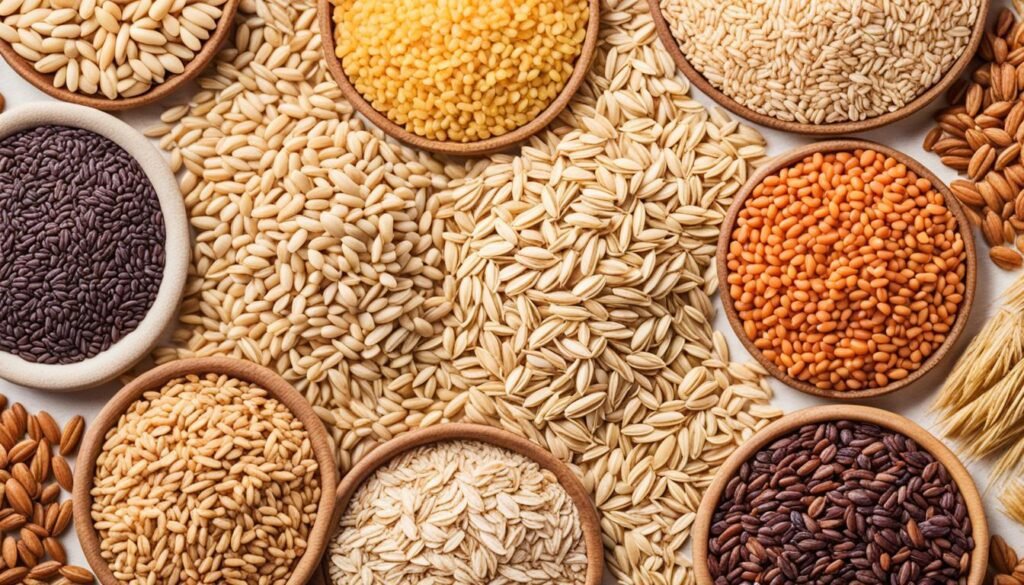
Including whole grains and low-GI carbs in our diet can greatly benefit the health of our skin. Whole grains, such as barley and oats, are packed with essential nutrients like selenium and fiber, which play a vital role in promoting skin repair and overall skin health. These nutrients support the skin’s natural rejuvenation process, resulting in a healthy and radiant complexion.
Low-GI carbs, on the other hand, have a slower rate of digestion, leading to a gradual release of sugar into the bloodstream. This helps prevent insulin spikes, which are known to contribute to inflammation and acne. By opting for low-GI carbs, such as sweet potatoes and quinoa, instead of refined grains and high-GI carbs, we can minimize the negative impact of blood sugar fluctuations on our skin.
By incorporating whole grains and low-GI carbs into our skin-friendly diet, we are providing our bodies with the necessary nutrients and maintaining a balanced complexion. Let’s take a closer look at the benefits of these food choices:
Benefits of Whole Grains for Healthy Skin:
- Rich in selenium, which promotes skin repair and helps maintain skin elasticity
- Packed with fiber, which aids in digestion and supports a healthy gut, leading to improved skin health
- Contain vitamins and minerals, such as B vitamins and zinc, which contribute to the overall health and appearance of the skin
Benefits of Low-GI Carbs for Skin Health:
- Stabilize blood sugar levels, preventing insulin spikes that can contribute to inflammation and acne
- Promote a more balanced complexion by minimizing skin issues associated with high blood sugar levels
- Provide sustained energy throughout the day, reducing the likelihood of energy crashes that can affect skin health
By making whole grains and low-GI carbs a regular part of our skin-friendly diet, we can support our skin’s health and achieve a natural glow. Let’s make conscious choices when it comes to our nutrition and prioritize foods that nourish our skin from the inside out.
The Impact of Lifestyle Factors on Skin Health
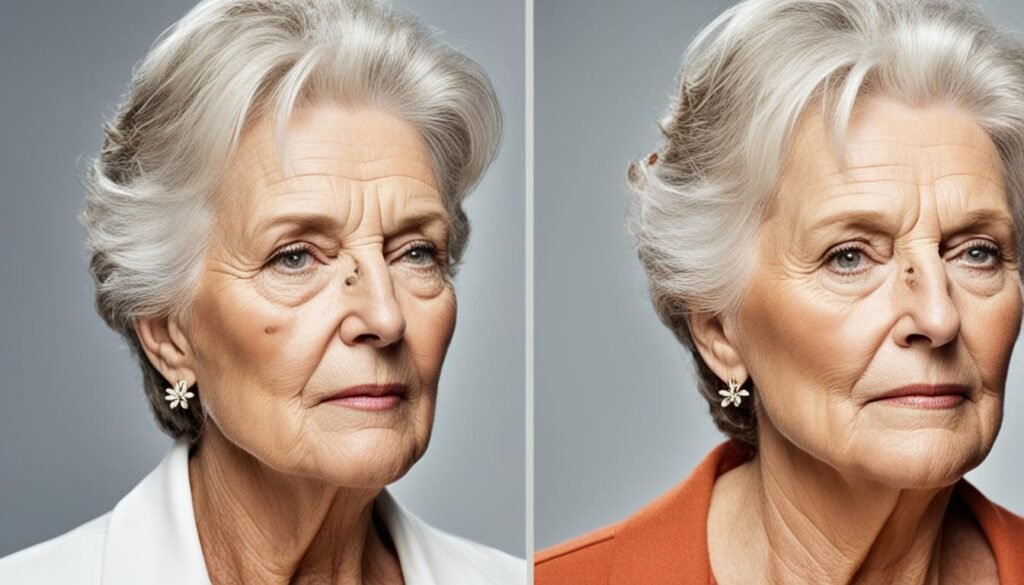
In addition to nutrition, certain lifestyle factors can significantly impact our skin health. Smoking and excessive alcohol consumption have been linked to premature aging and skin damage. These habits can deplete the skin’s moisture and elasticity, leading to wrinkles, sagging, and dullness. Other factors, such as stress, lack of sleep, and exposure to environmental pollutants, can also affect our skin’s appearance.
By adopting healthy lifestyle habits, such as quitting smoking, reducing alcohol intake, managing stress, and practicing good skincare habits, we can support our skin’s health and promote a youthful and radiant complexion.
| Lifestyle Factor | Effects on Skin | Recommended Actions |
|---|---|---|
| Smoking | Quit smoking to prevent premature skin aging and improve overall skin health. | |
| Excessive Alcohol Consumption |  |
Reduce alcohol intake to minimize skin damage and maintain skin’s moisture and elasticity. |
| Stress | Manage stress through relaxation techniques and self-care practices to prevent skin issues caused by stress hormones. | |
| Lack of Sleep | Get sufficient sleep to allow the skin to regenerate and repair itself overnight. | |
| Exposure to Environmental Pollutants | Protect the skin from pollutants by using sunscreen, cleansing regularly, and maintaining a healthy skincare routine. |
By making conscious choices to improve our lifestyle habits, we can positively impact our skin’s health and maintain a youthful and radiant complexion.
Conclusion
Achieving healthy and radiant skin starts from within. By following a nutrition guide for healthy skin, I can provide my skin with the necessary nutrients to thrive. Key factors such as including antioxidant-rich foods, essential fatty acids, and staying hydrated can significantly improve my skin’s health and appearance.
By incorporating a skin-friendly diet into my lifestyle, I can nourish my skin from the inside out. Including foods rich in vitamins A, C, and E, as well as essential fatty acids, can help support collagen production, protect against free radicals, and maintain the skin’s moisture barrier.
In addition to proper nutrition, adopting a healthy lifestyle and practicing good skincare habits are essential for achieving and maintaining beautiful skin. This includes avoiding harmful habits like smoking and excessive alcohol consumption, managing stress levels, getting enough sleep, and protecting the skin from environmental pollutants.
By making nutrition and skincare a priority and implementing these skincare tips into my daily routine, I can unlock the secret to healthy and beautiful skin. With the right diet, lifestyle, and self-care practices, I can achieve a glowing complexion and enjoy the benefits of a healthy skin diet.
FAQ
How does nutrition affect the health of our skin?
Our nutrition plays a crucial role in maintaining healthy, radiant skin. What we eat directly affects the health and appearance of our skin. Neglecting proper nutrition can lead to various skin issues such as dryness, acne, and premature aging.
What should I include in a skin-friendly diet?
A skin-friendly diet should include a variety of fruits, vegetables, whole grains, lean proteins, and healthy fats. These provide the necessary nutrients to support clear and radiant skin.
Which nutrients are important for skin health?
Some important nutrients for skin health include vitamin A, antioxidants (such as vitamins C and E, selenium, and zinc), and essential fatty acids (like omega-3 and omega-6).
How do antioxidants benefit the skin?
Antioxidants help fight free radicals, protect the skin against environmental stressors, promote collagen synthesis, and maintain a youthful complexion. Foods like berries, citrus fruits, dark chocolate, and green tea are all excellent sources of antioxidants.
What is the role of essential fatty acids in maintaining healthy skin?
Essential fatty acids help support the skin’s barrier function, keeping it hydrated and preventing moisture loss. Foods rich in essential fatty acids include fatty fish, walnuts, flaxseed oil, and avocados.
Why is hydration important for healthy skin?
Proper hydration helps flush out toxins, keeps skin cells hydrated, and promotes a clearer complexion. It is recommended to drink at least 8 glasses of water a day and consume foods with high water content to support skin hydration.
How do whole grains and low-GI carbs impact skin health?
Whole grains provide valuable nutrients like selenium and fiber, which promote skin repair and overall skin health. Low-GI carbs release sugar into the bloodstream slowly, preventing insulin spikes that can contribute to inflammation and acne.
How do lifestyle factors affect skin health?
Smoking and excessive alcohol consumption have been linked to premature aging and skin damage. Other factors such as stress, lack of sleep, and exposure to environmental pollutants can also affect the skin’s appearance.

